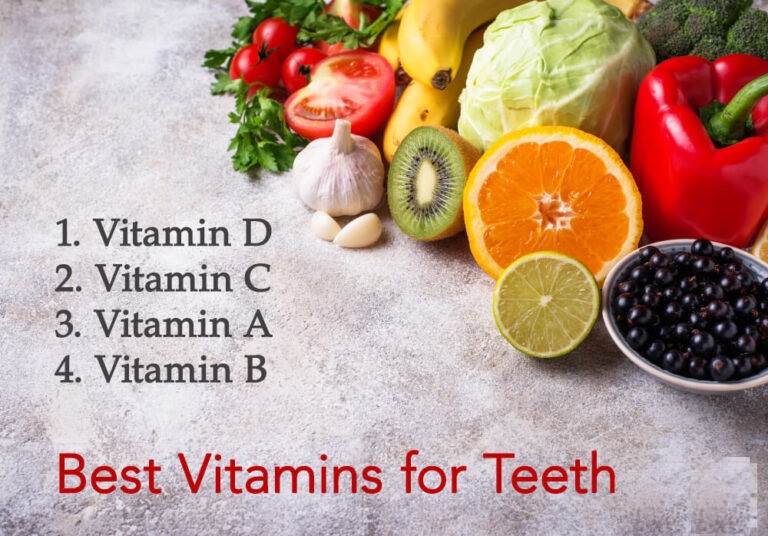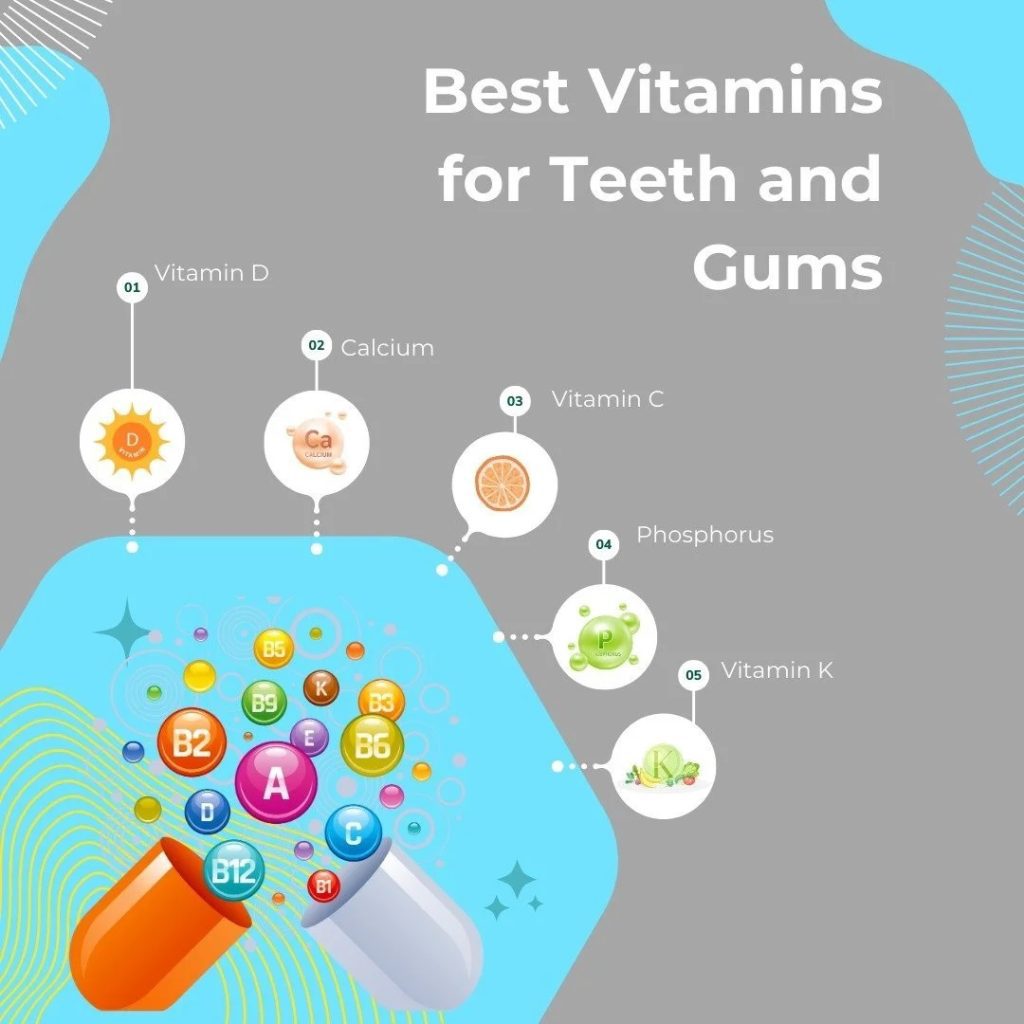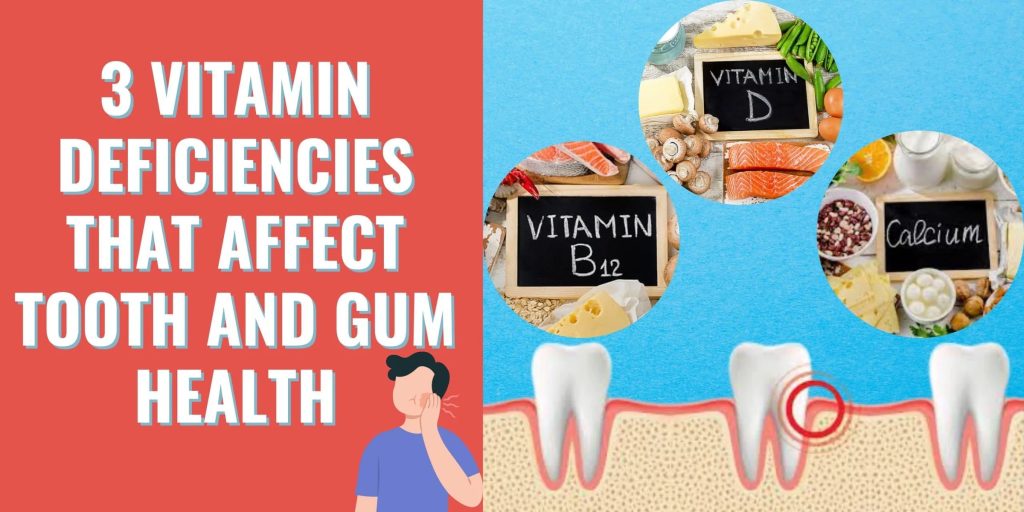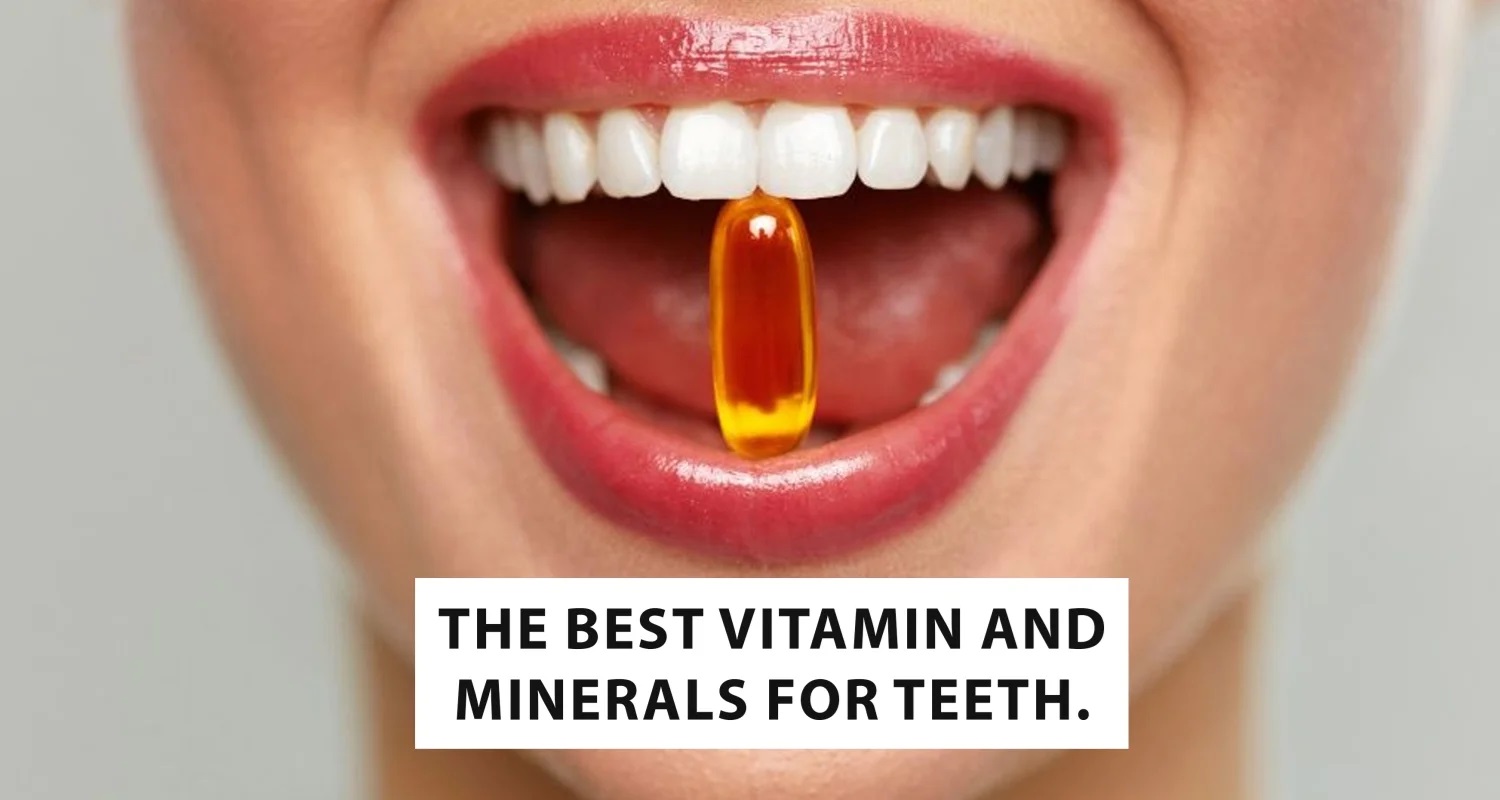Eating the right foods is very important to keep you healthy and free from various diseases. Though all the food items contain certain minerals and vitamins in different amounts, they provide rich sources of energy and fulfil other needs of our body. But different organs of the body need different types of vitamins and minerals in certain quantities to keep functioning properly and stay healthy.
Similarly, teeth are one of the most important parts of our body that need certain minerals and vitamins to keep teeth healthy and strong. Vitamins are organic compounds produced by plants and animals, while minerals are inorganic elements found in soil and water. Here we are going to discuss about the best vitamins and minerals for teeth, which help to keep teeth strong and healthy.
What Vitamins are Good for Teeth?
Vitamins are playing a big role in keeping our teeth and gums strong while strengthening the enamel and bone of the teeth structure. Apart from those Vitamins, they also help in saliva production in your mouth and also help in nutrient absorption and maintain the gum tissues. Let’s find out what the best vitamins are for gums and teeth, with the recommended foods containing such vitamins.

Vitamins for Strong, Healthy Teeth and Gums
Vitamin A
This is not only good for your skin and eyes, but also necessary for your oral health. Yes, Vitamin A helps to produce the saliva that helps to break down the food and removes the bacteria from the teeth. Vitamin A also helps to maintain healthy mucous membranes and soft tissues in the mouth, which also protects your mouth from bacteria that are bad for your teeth.
A deficiency of Vitamin A in your mouth leads to dryness in the mouth that can increase the chances of oral infections. To fulfil your vitamin needs, you can consume carrots, sweet potatoes, spinach, bell peppers, plus fish, egg yolks and dairy products that are rich in Vitamin A.
Vitamin C
Vitamin C plays an important role in strengthening your gums, which are responsible for keeping your teeth strong. Apart from that, it also protects your teeth from gingivitis and keeps the connective tissues in your gums healthy and strong. A lack of Vitamin C can cause bleeding gums and other gum diseases. Citrus fruits, peppers, sweet potatoes, broccoli, berries, and kale are rich in Vitamin C.
Vitamin D
Vitamin D plays a big role in absorbing the calcium in our body that is necessary for the strength of our bones and teeth. It not only helps in maintaining the immune function while reducing the inflammation, but a lack of Vitamin D can lead to weakening of bones, tooth decay or cavities and gum diseases.
To increase the Vitamin D intake, you can consume fatty fish like salmon, egg yolks, and fortified foods like milk, orange juice, and cereal. However, one of the best natural sources of Vitamin D is exposure to sunlight, especially in the morning and at sunset, to keep your bones and teeth strong and healthy.
Vitamin K
It is necessary for the metabolism of calcium in our body, which helps to keep our teeth strong. Moreover, it also ensures keeping the teeth strong and protective against tooth decay. Vitamin K helps to produce osteocalcin, a kind of protein that supports bone strength. A lack of Vitamin K can slow down the healing process of your body, and in case of minor injuries, you are more likely to bleed.
Vitamin B
The different types of Vitamin B, like B1, B2, B3, B6, B9, and B12, are necessary for producing energy, repairing the cellular and synthesising DNA. Apart from that, it also helps to keep gums and tissues healthy by promoting blood circulation in your body. Though Vitamin B3 (niacin), Vitamin B2 (riboflavin) and other B vitamins help to reduce inflammation and gingivitis and lower the risk of tooth decay.
What Minerals Are Good for Teeth?
Minerals are very important for our body, and for teeth, they help to build the blocks of the tooth enamel and bones. This provides the strength and protection against tooth decay, acid erosion and cavities. Different types of minerals like calcium, phosphorus, magnesium and potassium all help the body to repair minor damages and prevent the teeth from further degradation.

Mineral for Healthy Teeth and Gums
Calcium
Calcium is one of the most important minerals that helps to keep our bones and teeth strong. Apart from that, calcium also helps to protect tooth enamel and repair damage caused by the harmful bacteria. A deficiency of calcium in our body can lead to tooth decay, and in extreme conditions, it can be a reason for tooth loss.
You can find a high amount of calcium in various foods and vegetables such as leafy greens like kale, spinach, and collard, including all the dairy products like milk, yoghurt and cheese. Apart from that, you can also find calcium in other foods like broccoli, almonds, and fortified plant-based milk.
Potassium
Though the role of potassium in our body is to maintain the electrolyte balance and support healthy nerve function, it is important for the sensation of your teeth and gums. Apart from that, it also helps to improve the density of your bones and helps gum tissue heal quickly.
Apart from that, potassium also plays an important role in balancing the pH levels in your mouth, which helps to reduce the erosion of acid on tooth enamel. A lack of potassium in our bodies can cause tooth loss. You can add potassium-rich foods to your diet, like bananas, oranges, sweet potatoes, and tomatoes.
Phosphorus
It is another important mineral already present in your bones and your DNA. One of the functions is with calcium to create hydroxyapatite, which is another main structural component of bones and tooth enamel. Though the main role of phosphorus is supporting the role of calcium in the production of bones, it also protects and rebuilds tooth enamel.
Further, phosphorus also helps in the absorption of calcium while enhancing its effectiveness in strengthening dental structures. Phosphorus is found in many types of foods like meat, milk, and whole grains, fish, dairy products and plant-based foods like soybeans, lentils and pumpkin seeds.
Magnesium
The functioning of magnesium works with calcium, ensuring the effective integration of the mineral into tooth enamel while producing bone and building healthy teeth. Further, this mineral helps to maintain the density of bones, including the surrounding of the teeth.
A deficiency of magnesium in your body can cause various diseases, such as tooth sensitivity and tooth decay. Hence, to maintain the intake of magnesium in your body, you can add foods like bananas, avocados, whole grains, and dark chocolate to your regular diet.

Also Read: How to Cure Sensitive Teeth & Treatment for Sensitive Tooth
Other Minerals for Healthy Teeth
Apart from the above essential minerals, zinc, fluoride, melatonin, and omega-3 fatty acids are other minerals that help to keep your teeth strong and healthy. Zinc supports healthy teeth by controlling plaque, reducing tartar buildup, and minimising bad breath (halitosis). On the other hand, Melatonin support healthy teeth by promoting bone formation.
Melatonin also helps to reduce inflammation and oxidative stress in periodontal tissues, protecting pulp cells from damage, and aiding in tooth development. Similarly, Omega-3 fatty acids support healthy teeth and gums by reducing inflammation, and fluoride helps to strengthen tooth enamel, inhibits acid production by cavity-causing bacteria, and helps to repair early tooth decay. For fluoride, you can use the fluoride-based toothpaste and keep your teeth and gums strong and healthy. And if you have any dental problems, you can visit your nearest best dentist in Greater Noida at Dr. Sinha Dental Clinic to get the best treatment and care for all dental problems.


